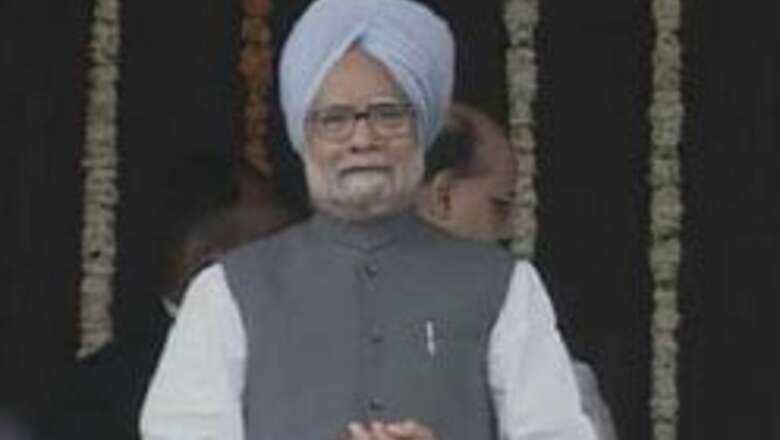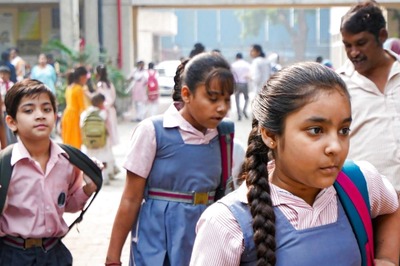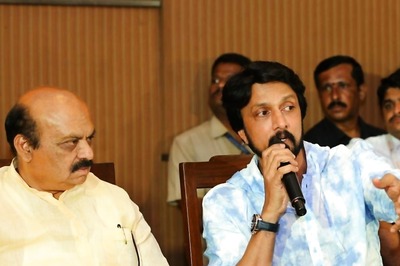
views
Srinagar: Despite a separatist boycott of the roundtable conference in Srinagar, Prime Minister Manmohan Singh was upbeat as the talks ended on Thursday.
He made a rare acknowledgment of human rights violations and announced measures aimed at ending 16 years of violence in the region.
Manmohan Singh said India was ''committed'' to living in harmony with Pakistan and to resolving the issue of Kashmir with a lasting peace treaty.
He also said the number of troops in the state - estimated at more than half a million - could be reduced if violence abated, and promised to hold talks with rebels if they ended terror attacks.
![]() Consensus eludes J&K Roundtable
Consensus eludes J&K Roundtable
![]() PM to launch schemes for orphan rehab
PM to launch schemes for orphan rehab
''This conference certainly gives hope and confidence. I see light at the end of the tunnel, a ray of hope,'' he said.
But suspected militants delivered a grim reminder of his challenges barely an hour after he flew out of the region, killing a man, a woman and a child in an explosion that blew up a bus carrying Indian tourists.
The explosive was apparently planted by militants inside the bus, said Senior Superintendent of Police Munir Khan. Seven people were injured. Khan had earlier said two women were killed.
Kashmiri separatist groups, which seek the region's merger into Pakistan or the creation of a separate nation, boycotted the talks, saying they will not sit at a negotiating table with pro-India groups but were willing to meet him separately.
Singh, who met them in New Delhi in February, declined to do so this time.
He proposed several measures to encourage contacts and interaction among Kashmiris divided by the India-Pakistan border, including evolving simpler travel procedures and finding new travel routes.
Progress on the measures would be taken up in future rounds of talks, he said. He also said what few Indian officials like to say publicly - that human rights abuses by security forces are taking place.
''Our armed forces are not armed forces of occupation, they are there to protect ... our citizens. They have a very sound record but it does happen,'' Singh said.
''I cannot deny sometimes aberrations do take place but these aberrations cannot be allowed to become a norm.''
He said the government had told the security forces that ''there should be zero tolerance for human rights violations.''
Militant Islamic groups had threatened to sabotage the two-day talks, which began on Wednesday, and called a general strike that shut shops, businesses and schools for a second day on Thursday.
The largest Kashmiri rebel group, Hizb-ul-Mujahedeen, said there could be no peace without the participation of rebels in the talks.
''The dream of peace will never become reality unless mujahedeen (freedom fighters) participate in the peace talks. India should understand that,'' Junaid-ul-Islam, the group's spokesman, said in a statement given to a local news agency, Current News Service.
Singh responded: ''Anybody who shuns violence and gives up the path of terror ... We are willing to find ways and means to interact with all such groups.''
The boycott by the separatist All Parties Hurriyat Conference ruined the government's hopes of bringing pro-India Kashmiris and separatist political leaders to the same negotiating table to discuss ways to achieve peace in Indian-controlled Kashmir.
''I am not an astrologer, but I have not lost hope that ultimately good sense will prevail that all those who are in favor of a peaceful resolution of the problems facing this state will work together,'' Singh said.
Dozens of separatist groups are fighting for the independence of the Indian-held portion of Kashmir, or its merger with mostly Muslim Pakistan. Both India and Pakistan claim all of Kashmir.
Omar Abdullah, president of the main opposition National Conference, proposed that Kashmir get more autonomy within the Indian union - something midway between the separatists' demand for secession and the pro-India groups' stand that Kashmir should be treated like other Indian states.
The Kashmir talks come alongside a sweeping peace process currently under way between India and Pakistan.
''I have a vision that the peace making process must ultimately culminate in our two countries entering into a treaty of peace, security and friendship,'' Singh said in a statement after the talks.
''We are sincerely committed to the prosperity, unity, development and well-being of Pakistan. When our neighbors live in peace, we live in peace,'' he added.




















Comments
0 comment